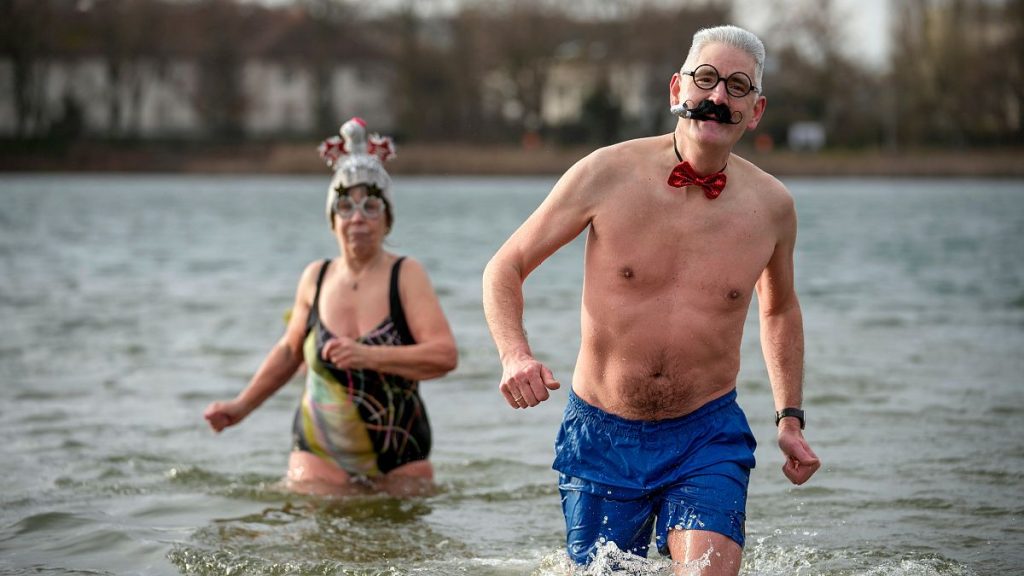The dawn of 2025 witnessed a diverse tapestry of New Year’s traditions across Europe, with some embracing the icy embrace of winter waters while others mourned the disruption of cherished rituals due to inclement weather. In Germany and Italy, time-honored customs involving plunges into frigid rivers and lakes continued, showcasing both the human spirit of resilience and the enduring power of tradition. However, in the Netherlands, a popular New Year’s Day dive was regrettably cancelled, highlighting the unpredictable nature of nature and its occasional interference with human celebrations.
Berlin, Germany, played host to the annual ice bathing tradition of the Berlin Seals swimming club. Undeterred by the biting cold, these hardy individuals plunged into the frigid waters, their laughter and spirited dances echoing the joy of welcoming a new year. With water temperatures hovering around 6°C and the air temperature a mere 4°C, the act of submerging oneself in such conditions showcased a remarkable display of fortitude and a unique way of embracing the fresh start that a new year represents. For members like Harold Kraft, this invigorating ritual is not just a physical challenge but an integral part of their New Year’s celebration, a refreshing and symbolic cleansing as they step into the unknown.
Across the Alps, in Rome, Italy, another aquatic tradition unfolded, albeit with a touch of bittersweet nostalgia. Three daring individuals took the plunge from the 18-meter-high Cavour Bridge into the Tiber River, continuing a custom that dates back to 1946. This year’s event, however, marked a significant transition. Maurizio Palmulli, affectionately known as “Mr. Ok,” and the man who revived this tradition in 1989, symbolically passed the torch to fellow veteran diver Marco Fois. This handover marked Palmulli’s retirement, a poignant moment that underscored the passage of time and the changing of the guard within this unique community of divers.
Fois, accompanied by divers Walter Schirra and Simone Carabella, executed a spectacular jump into the Tiber, their graceful descent captured against the backdrop of the historic city. Awaiting them below was a team of firefighters in a dinghy, ready to retrieve the divers from the chilly waters, ensuring their safety and the continuation of this cherished tradition. This carefully orchestrated ritual, with its blend of daring athleticism and meticulous planning, exemplifies the dedication and respect that these divers hold for their unique New Year’s custom.
Meanwhile, in the Netherlands, the typically vibrant atmosphere of the New Year’s Dive at Scheveningen beach in The Hague was replaced by a sense of disappointment. This massively popular event, which usually attracts approximately 10,000 participants eager to start the year with a bracing dip in the North Sea, fell victim to the unpredictable forces of nature. Strong winds forced the cancellation of the event, marking only the second time in its history that it has been called off, the previous instance being in 2007 for the same reason.
The cancellation of the Scheveningen dive serves as a stark reminder of the power of nature and its capacity to disrupt even the most well-established traditions. While the thousands of participants who had looked forward to the invigorating plunge were undoubtedly disappointed, the decision to prioritize safety underscores the responsible approach taken by the organizers. This unforeseen cancellation, however, allows us to reflect on the significance of these New Year’s rituals, their ability to bring communities together, and the resilience of both individuals and traditions in the face of unexpected challenges. The diverse range of New Year’s celebrations, from icy plunges to cancelled dives, highlights the human capacity for both embracing and adapting to the ever-changing circumstances that shape our lives.














